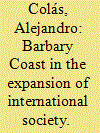| Srl | Item |
| 1 |
ID:
148787


|
|
|
|
|
| Summary/Abstract |
From the ‘long’ sixteenth century the Ottoman regencies of North Africa operated as major centres of piracy and privateering across the Mediterranean Sea. Though deemed by emerging European powers to be an expression of the ‘barbarian’ status of Muslim and Ottoman rulers and peoples, piracy, and corsairing in fact played a major role in the development of the ‘primary’ or ‘master’ institutions of international society such as sovereignty, war, or international law. Far from representing a ‘barbarian’ challenge to the European ‘standard of civilization’, piracy and privateering in the modern Mediterranean acted as contradictory vehicles in the affirmation of that very standard.
|
|
|
|
|
|
|
|
|
|
|
|
|
|
|
|
| 2 |
ID:
188702


|
|
|
|
|
| Summary/Abstract |
This article mobilises the notion of global food regime to explore ways in which modern International Relations are reproduced through distinctive patterns of alimentary domination and subversion. It considers three ideal-typical international encounters – the Spanish conquest of the Americas, British rule in South Asia and the US occupation of Japan – to offer a stylised historical-sociological comparison of how food becomes a powerful site of interaction between conflicting dynamics of social differentiation and incorporation, segregation and admixture, and domination and subversion. The Spanish, British and Americans deployed different strategies of alimentary domination in these contexts, which can in large measure be explained with reference to their prevailing mode of production. But they also unleashed equally potent forces of culinary adaptation, transculturation and innovation which, in bringing together a multiplicity of foodways, subverted both the rigid structures of imperial rule and notions of a pristine pre-colonial or national cultural traditions.
|
|
|
|
|
|
|
|
|
|
|
|
|
|
|
|
| 3 |
ID:
085399


|
|
|
|
|
| Publication |
2008.
|
| Summary/Abstract |
This article argues that the contemporary American empire displays two structural limits. The first refers to geographical limits. As opposed to most of its imperial predecessors, the logic of contemporary US power militates against direct, territorial domination as a means of sustaining global hegemony. The second limitation, tightly linked to this first one, is that of power defined in a conventional sense as the capacity to secure outcomes. Consequently, since 1945 the USA has generally projected its global power through open doors (capitalist markets) and closed frontiers (sovereign territorial states). The article explores the peculiar limits to US empire with reference to two of its principal western precursors - the Roman and British empires - and concludes that the recent invasion and occupation of Iraq highlights the perils of an American strategy that seeks to conquer territories militarily and politically control their populations.
|
|
|
|
|
|
|
|
|
|
|
|
|
|
|
|